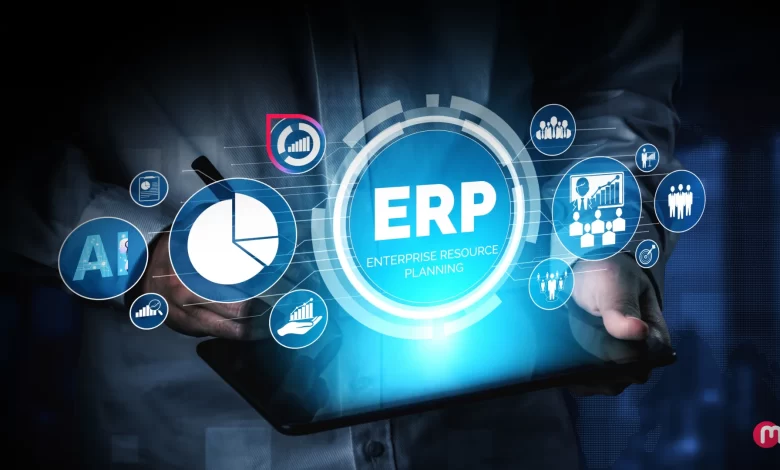Types, Benefits, Use Cases, Future Trends, & More

The integration of AI in ERP systems goes beyond just implementing the latest technology; it lays the foundation for future growth, innovation, and business success. This empowers decision-makers to navigate the complexities of the modern business landscape with agility, efficiency, and foresight. In this article, we will explore the key types of AI in ERP, their real-world use cases, and how they can transform operations for a competitive edge.
AI in ERP refers to the incorporation of AI technologies like Machine Learning (ML), Natural Language Processing (NLP), Deep Learning, and more into ERP systems. This integration aims to enhance efficiency, optimize decision-making, and provide real-time insights, leading to improved business performance and cost savings.
Consider a growing manufacturing company that relies on manual financial reporting processes. These processes are time-consuming, error-prone, and struggle to keep up with complex regulatory changes. As the company expands, errors in financial data or missed compliance deadlines could lead to costly consequences. The solution? Leveraging ERP software development services to integrate AI-powered automation into their ERP system. This scenario is not limited to manufacturing but is common across various industries from retail and finance to healthcare and logistics.
To provide a comprehensive understanding of AI in ERP, let’s delve deeper into the types of AI in ERP systems, benefits, use cases, implementation challenges, and more.
Traditional ERP vs AI-Enabled ERP
Traditional ERP systems rely on rule-based logic and historical data, making them reactive and limited in adaptability. On the other hand, AI-enabled ERPs integrate machine learning and predictive analytics to automate processes, uncover patterns, and deliver real-time data-driven insights, enabling smarter, faster business decisions.
ERPs have always been the backbone of operational efficiency. However, in a world where technology evolves daily, traditional ERP systems struggle to keep up with the demands for real-time decision-making, predictive insights, and scalable intelligence. This necessitates a next-generation upgrade (AI-enabled ERP) that transforms static systems into self-learning, adaptive platforms capable of analyzing trends, anticipating disruptions, and recommending actions.
Here’s a comparison showing why AI-enabled ERP systems are a smarter business decision compared to traditional ERP systems:
- Data Handling: Manual data entry and batch processing vs. real-time, automated data ingestion & analysis
- Decision-Making: Based on static reports vs. predictive and prescriptive recommendations
- Reporting: Predefined reports vs. dynamic dashboards with auto-generated insights
- Forecasting: Historical trend-based vs. predictive analytics powered by machine learning
- User Interaction: Complex UI, technical knowledge needed vs. natural language queries, voice assistants
- Automation: Limited automation vs. RPA (Robotic Process Automation) for repetitive tasks
- Error Detection: Reactive (after the issue occurs) vs. proactive (anomaly detection in real-time)
- Adaptability: Requires manual updates vs. continuously improves with AI/ML learning
- Personalization: One-size-fits-all workflows vs. smart recommendations tailored to user behavior
- Integration: Static, complex integrations vs. seamless API-based and AI-enhanced integration
- Scalability: More effort to scale with growth vs. scales intelligently based on usage patterns
- Cost Optimization: Indirect, through efficiency vs. direct, via insights on cost-saving opportunities
Types of AI in ERP
ERP systems now incorporate various types of AI, including machine learning, natural language processing, and generative AI, to enhance automation, decision-making, and user interaction. From machine learning to GenAI, here is how AI is changing enterprise resource planning:
- Machine Learning: An ERP system featuring machine learning technology detects patterns in massive datasets and learns from historical and real-time data, enabling automatic adjustments and predictions without reprogramming.
- Natural Language Processing: Enables ERP systems to understand, interpret, and respond to human language, spoken or written.
- Chatbots and Virtual Assistants: AI-powered tools that bring conversational intelligence to ERP systems, handling queries, guiding workflows, and automating routine tasks.
- Predictive Analytics: Empowers ERP systems to forecast future trends, behaviors, and outcomes by leveraging ML algorithms and big data technologies.
- Computer Vision: Enables ERP systems to analyze, identify, and interpret visual information from images or videos.
- Generative AI: A cutting-edge technology designed to analyze data and create new content or synthetic data.
- Robotic Process Automation (RPA): Involves using software robots to automate repetitive, rule-based tasks within ERP systems.
- Advanced Analytics: Uses sophisticated data analysis techniques to uncover hidden patterns, predict future trends, and optimize business processes.
- Decision Intelligence: Combines data science services, AI, and decision theory to help organizations make more informed, strategic decisions.
- Deep Learning: A subset of machine learning that enables ERP systems to process large volumes of unstructured data such as images, voice, and text.
Benefits of Integrating AI in ERP Systems
AI empowers ERP systems to deliver smarter, faster, and more efficient results. Some key advantages of embedding AI in ERP systems include:
- Boosts Productivity and Efficiency: Time-saving AI features automate repetitive and manual tasks, accelerating internal operations.
- Improves Reporting and Insights: AI-driven ERP systems provide real-time, visual, and intuitive reporting, delivering deep, contextual insights.
- Better Forecasting: AI empowers ERP systems with predictive analytics capabilities, allowing businesses to forecast demand, revenue, inventory needs, and maintenance schedules with improved accuracy.
- Enhances Customer and Employee Experience: AI technologies such as NLP, chatbots, and virtual assistants transform customer engagement and support.
- Data-Driven Decision-Making: AI brings powerful decision-support tools to ERP systems, surfacing trends, patterns, and anomalies in real-time data.
- Helps With Cost Optimization: AI in ERP systems helps identify cost-saving opportunities, improve budgeting accuracy, and reduce waste.
Top 7 AI Use Cases in ERP
Several AI use cases are reshaping ERP systems and redefining how businesses operate. Some of the top AI use cases in ERP include:
- Document & Workflow Automation: AI technologies like OCR and NLP extract, interpret, and classify data from documents in real time.
- Automated Repetitive Accounting Functions: AI algorithms automate tasks like accounts payable/receivable, bank reconciliation, and journal entry creation.
- Personalized Experiences: AI captures and analyzes user behavior to personalize the user experience within ERP platforms.
- AI-Powered Customer Service Chatbots: Chatbots built using Conversational AI provide 24/7 customer support within ERP portals.
- Advanced Data Analysis: ERP systems powered by predictive modeling, regression analysis, and data mining tools spot performance trends and forecast demand.
- Real-Time Supply Chain Visibility and Optimization: AI for supply chain ERP offers complete visibility across the supply chain using IoT sensor integration and predictive modeling.
- Anomaly Detection and Fraud Prevention: AI continuously monitors transactional data, identifying unusual patterns and alerting users to deviations.
Challenges of AI in ERP
Implementing AI in ERP systems comes with challenges that organizations need to overcome to fully realize AI’s potential. Some common challenges include:
- Data Quality Issues: Poor data quality can lead to inaccurate predictions and flawed decisions.
- Data Silos and Integration Complexities: Disconnected systems block the full potential of AI-powered automation and analytics.
- Change Management and User Adoption: Employees may resist changes due to fear of job loss or lack of understanding.
- Data Privacy & Security: Protecting sensitive data is critical to building trust and ensuring compliance.
Overcoming these challenges often requires deep technical expertise and tailored implementation strategies.
The Future of AI in ERP
The future of ERP systems lies in hyperautomation, Explainable AI (XAI), augmented intelligence, and more. These trends will enable organizations to scale faster, reduce manual errors, and adapt in real time to changing market conditions.
Need Help With Implementing AI in ERP?
Integrating AI into ERP systems can unlock game-changing efficiency and insight. At MindInventory, we engineer breakthroughs, designing AI solutions tailored to support revenue goals, operational agility, and competitive edge. Our AI solutions are engineered for impact, automating manual ERP tasks, enhancing forecasting accuracy, and driving results.
FAQs on AI in ERP
- How big is the AI in the ERP market? The market size of AI in ERP was valued at USD 4.5 billion in 2023 and is expected to grow at a CAGR of 26.30% to USD 46.5 Billion By 2033.
- What is the best AI for ERP? The best AI depends on your business needs, commonly used AI types in ERP include Machine Learning, Natural Language Processing, Predictive Analytics, RPA, Generative AI.
- What is the cost of implementing AI in ERP systems? The cost varies from $10,000 for small-scale AI automation to $10 million+ for enterprise-grade AI solutions.
- How is AI used in ERP? AI in ERP systems automates tasks, optimizes processes, predicts trends, supports decision-making, analyzes data, enhances customer support, and provides virtual assistance.
- What is the future of ERP systems? The future trends include cloud adoption, AI and machine learning, IoT integration, personalization, predictive analytics, AI agents, agentic AI, conversational AI, and more.
In conclusion, AI in ERP systems is revolutionizing how businesses operate, providing smarter, faster, and more efficient solutions. By integrating AI technologies into ERP systems, organizations can enhance productivity, improve decision-making, optimize processes, and stay ahead of the competition. If you need help with implementing AI in your ERP system, consider partnering with experts like MindInventory to drive successful AI adoption and achieve impactful results.




